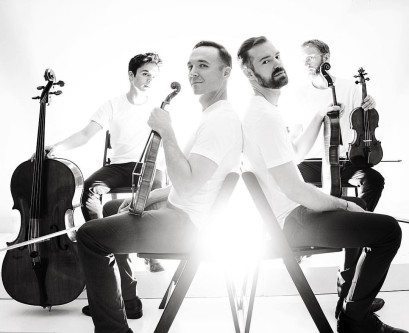 United States Gesualdo, Williams, Friedman, Zorn, Roman: Joshua Roman (cello), JACK Quartet (Christopher Otto, Austin Wulliman, violins; John Pickford Richards, viola; Jay Campbell, cello), presented by San Francisco Performances, Herbst Theatre, San Francisco. 13.10.2017. (HS)
United States Gesualdo, Williams, Friedman, Zorn, Roman: Joshua Roman (cello), JACK Quartet (Christopher Otto, Austin Wulliman, violins; John Pickford Richards, viola; Jay Campbell, cello), presented by San Francisco Performances, Herbst Theatre, San Francisco. 13.10.2017. (HS)

Gesualdo (arr. Ari Streisfeld): Three Madrigals For Five Voices: Candido e verde fiore; Ardita Zanzaretta; Ardo per te, mio bene
Amy Williams: Richter Textures
Jefferson Friedman: Quintet
John Zorn: Ouroboros
Joshua Roman: Tornado
The JACK Quartet focuses on contemporary music with fierce dedication and often finds extraordinary beauty. On one level the string ensemble’s recital captivated its audience with playing of precision, employing what they call “extended techniques” and dramatic expansion of dynamics. On a deeper level they took the audience on an excursion of uncommon intelligence, with unusual color and directness, and just enough dissonance as a reminder that this wasn’t Beethoven or Schubert.
Joshua Roman, the immensely talented cellist who has collaborated with the quartet for more than four years now, added his eloquent voice to four of the five works on this program, presented by San Francisco Performances at Herbst Hall Friday evening.
The highlight of the evening, Roman’s own composition Tornado, typifies the multiple levels of this ensemble’s repertoire. On its face, the 30-minute tone poem for cello-aided quintet describes a twister bursting through a tranquil day in Oklahoma, where Roman grew up. It is replete with unusual sound effects – the musicians sometimes bowing everywhere possible on strings, plus bridges, fingerboards, even the tailpiece. Slow glissandos emulate sirens. At one point the cellists run their hands over the strings to create a sound like wisps of wind.
But every time I thought, “this is getting too literal,” the music expanded upon these sound effects to take off on an abstract tangent, developing them into more complexity. It’s utterly absorbing, even if one ignores the storytelling.
The piece begins with a sunny scene-setter, sort of a modern-day version of the opening section of Rossini’s William Tell Overture as told by Copland. It could be a Romantic movie score, but soon a darker gesture sneaks in around the edges and gains in momentum. Dissonance increases, shifting between raw power and quieter stacked harmonies until the bass-clef instruments march through with inexorable power. The sound effects pile on. The tension tightens. An eerie stillness follows, punctuated by scrapings that perfectly emulate a rusty hinge and a creaking board. The scene-setting music returns, but different, transformed into something much less comfortable.
The quartet (violinists Christopher Otto and Austin Wulliman, violist John Pickford Richards and cellist Jay Campbell) and Roman executed the score as if it were child’s play, pushing the boundaries of dynamics and unique textures until it came to rest, fading hauntingly as it finished.
Roman and Campbell preceded that with their own tour-de-force, bringing jaw-dropping technique and musicianship to John Zorn’s Ouroboros, with its aggressively complex, blazingly fast-moving clashes of intersecting canons.
The program opened with a set of three five-part madrigals by Gesualdo, arranged in 2013 by Ari Streisfeld when he was a violinist with the JACK and made use of Roman’s then-new partnership. Playing without vibrato but with uncanny unanimity of pitch, the performers aimed for “just” intonation, which follows harmonic overtones rather than the equal temperament most common in Western music. Using no vibrato, along with extended techniques such as striking the strings occasionally with the bow, the group created unsettling moments. But they managed to achieve a sort of bare beauty in these sensual (in the strict sense of the word) pieces, especially in the otherworldly final measures of the second madrigal, Ardita Zanzaretta.
Amy Williams’ 2011 quartet, Richter Textures, takes as its inspiration seven abstract paintings by Gerhard Richter. More intellectual than visceral, the short connected sections create individual textures for a fascinating kaleidoscope. Jefferson Friedman’s Quintet, commissioned by Seattle’s Town Music (where Roman is artistic director), adds a cello to the string quartet roster for a solidly constructed and emotionally straightforward single movement. If it pulls some of its punches, it makes its argument with winning contrasts and bright tonal colors.
Given the palpabable sense of dedication to these contemporary composers – with their range of inventiveness, musical idioms and emotional shadings – JACK and Roman made the evening unto an unforgettable experience.
Harvey Steiman
